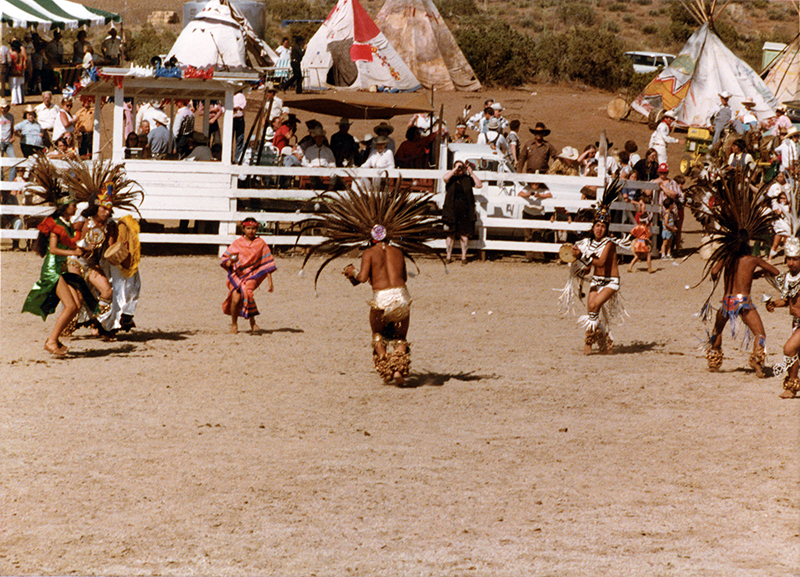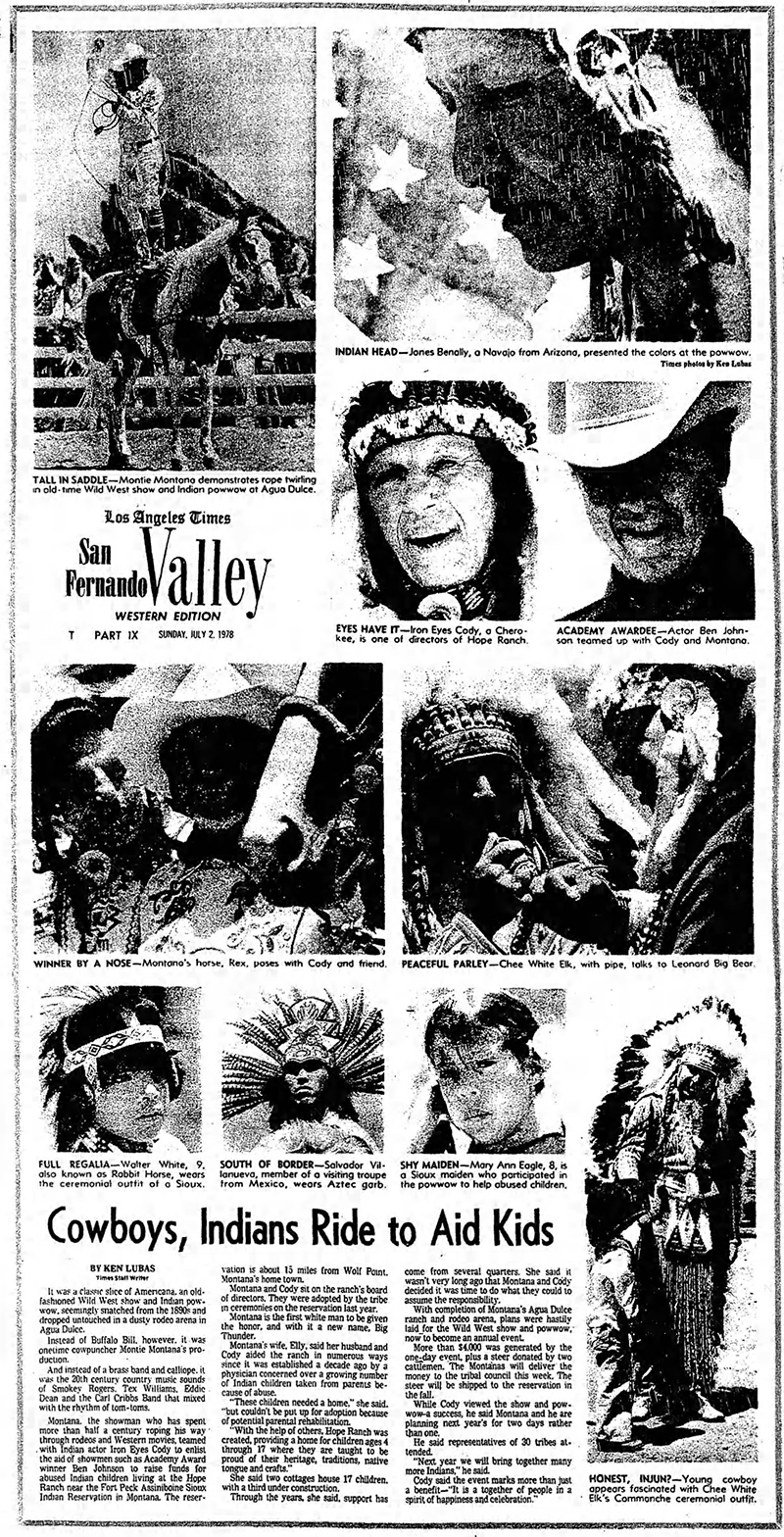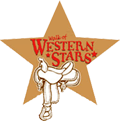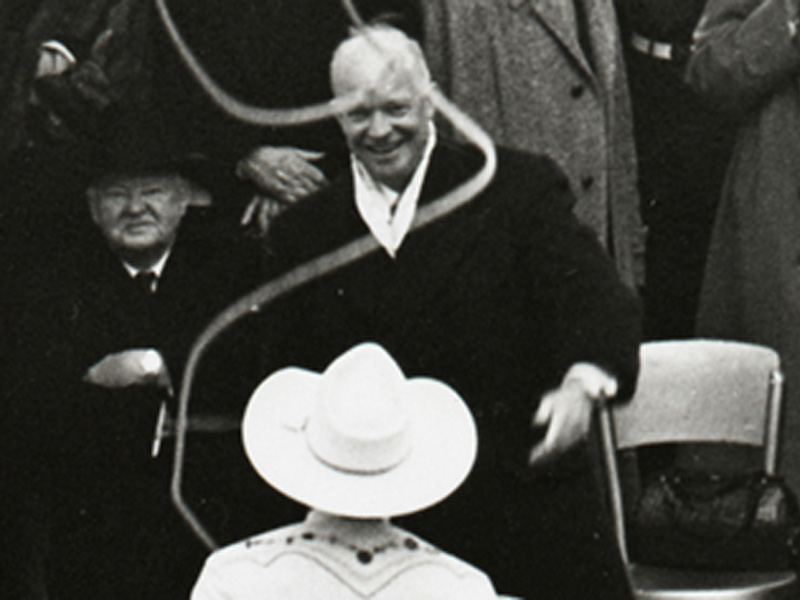|
|

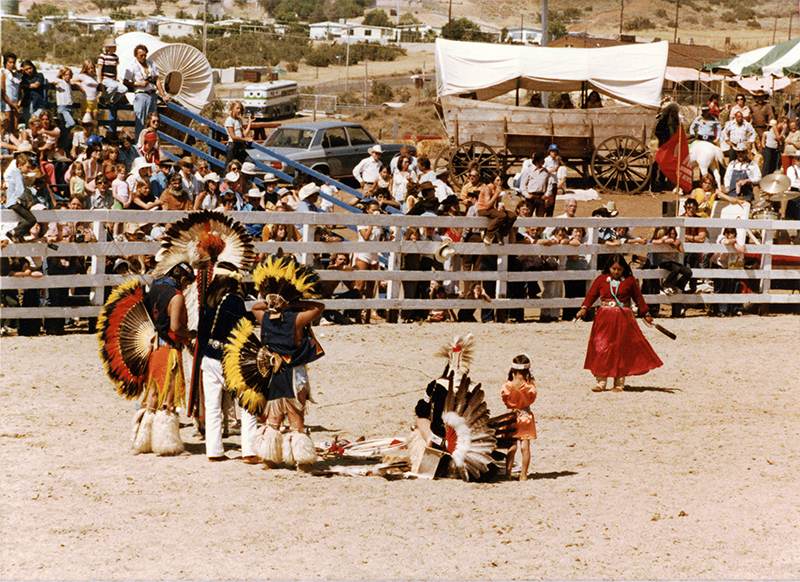
Click image to enlarge
June 25, 1978 — Wild West Show and Native American powwow at Montie Montana's ranch in Agua Dulce. Benefit for Hope Ranch, a nonprofit in the state of Montana that houses and helps abused Indian children. Montie moved in 1976 from a ranch in Northridge (Devonshire Downs) to the northeast corner of Agua Dulce Canyon Road and Escondido Canyon Road, across Escondido from Vasquez Rocks County Park. Two 5x7 photos by Bob Plunkett, P.O. Box 54 Amb. Sta., Los Angeles, CA 90070. From Montie's personal collection. Ex-Butterfields 2000, ex-EarthHunt.
Monty [sic] Montana to Stage Show.
Los Angeles Times | Sunday, June 18, 1978.
Agua Dulce — A benefit Western show and Indian powwow will be staged by entertainer Montie Montana at his rodeo ranch in Agua Dulce from noon to dusk Sunday, June 25. Proceeds will benefit abused Indian children. Admission is $10 per car. The Montana Ranch is at 10240 Escondido Canyon Road, north of Highway 14.
News story courtesy of Tricia Lemon Putnam, 2017.
Cowboys, Indians Ride to Aid Kids.
Los Angeles Times | San Fernando Valley Western Edition | Sunday, July 2, 1978.
It was a classic slice of Americana, an old-fashioned Wild West show and Indian powwow, seemingly snatched from the 1890s and dropped untouched in a dusty rodeo arena in Agua Dulce. Instead of Buffalo Bill, however, it was onetime cowpuncher Montie Montana's production. And instead of a brass band and calliope, it was the 20th-century country music sounds of Smokey Rogers, Tex Williams, Eddie Dean and the Carl Cribbs Band that mixed with the rhythm of tom-toms. Montana, the showman who has spent more than half a century roping his way through rodeos and Western movies, teamed with Indian actor Iron Eyes Cody to enlist the aid of showmen such as Academy Award winner Ben Johnson to raise funds for abused Indian children living at the Hope Ranch near the Fort Peck Assiniboine Sioux Indian Reservation in Montana. The reservation is about 15 miles from Wolf Point, Montana's home town. Montana and Cody sit on the ranch's board of directors. They were adopted by the tribe in ceremonies on the reservation last year. Montana is the first white man to be given the honor, and with it a new name, Big Thunder. Montana’s wife, Elly, said her husband and Cody aided the ranch in numerous ways since it was established a decade ago by a physician concerned over a growing number of Indian children taken from parents because of abuse. "These children needed a home," she said, "but couldn't be put up for adoption because of potential parental rehabilitation. "With the help of others, Hope Ranch was created, providing a home for children ages 4 through 17 where they are taught to be proud of their heritage, traditions, native tongue and crafts." She said two cottages house 17 children, with a third under construction. Through the years, she said, support has come from several quarters. She said it wasn't very long ago that Montana and Cody decided it was time to do what they could to assume the responsibility. With completion of Montana's Agua Duke ranch and rodeo arena, plans were hastily laid for the Wild West show and powwow, now to become an annual event. More than $4,000 was generated by the one-day event, plus a steer donated by two cattlemen. The Montanas will deliver the money to the tribal council this week. The steer will be shipped to the reservation in the fall. While Cody viewed the show and pow-wow a success, he said Montana and he are planning next year's for two days rather than one. He said representatives of 30 tribes attended. "Next year we will bring together many more Indians," he said. Cody said the event marks more than just a benefit — "It is a [get]-together of people in a spirit of happiness and celebration."
News story courtesy of Tricia Lemon Putnam, 2017.
About Montie Montana
Born Owen H. Mickel, Montie (June 10, 1910 - May 20, 1998) traveled with his dad, E.O. [Edgar Owen] Mickel, and mother [Mary Edna Harlan Mickel]. Billed as the Montana Cowboys, they did whip and rope acts and put on a slide show about the American West. In 1929 while working the Buck Jones Wild West Show, the announcer could not remember his name, so he announced him as Montie from Montana, and as Montie tells us in his autobiography, "the crowd loved it and so did I." From then on he became known as Montie Montana. As a star of silver screen, stage and rodeo arena, Montie entertained audiences around the world for more than 70 years. He rode in 60 consecutive Rose Parades and is famous for roping President Eisenhower in the 1953 Inaugural Parade. From 1945 to 1965 Montie thrilled over 8 million school children with his stagecoach and horse, Rex. Montie was famous for riding his horses into equally famous places such as the top of the Empire State Building, the Beverly Wilshire hotel in Beverly Hills, the Brown Palace in Denver, the Broadmoor in Colorado Springs and top-level government offices across the country. Though he received hundreds of awards and honors during his extraordinary lifetime, he remained a cowboy at heart. Montie was deeply grateful that he could make a living doing what he loved best — and it showed. He had the most wonderful laugh and was always smiling. An avid collector of Western artifacts, he kept treasures from early on in his career and enjoyed them throughout his life. His legacy will live on with the stories captured in this autobiography where he tells us that he lived in a great era, from the horse and buggy to the space age. Although he has ridden on ahead, I know that he's in tall cotton with other great Western heroes up there and that his horses are knee deep in green pastures and that he's still a cowboy, because he always said, "I must have been born a cowboy because I've never thought of being anything else." Further reading: Read more about Montie Montana here.
LW2953: 9600 dpi jpeg from original photograph purchased 2017 by Leon Worden from EarthHunt.
|
SCVTV Interview ~1995
First Touring Wagon 1925
Pendleton 1927 Rope
Handbill 1929
With Jerry Colonna ~1940s
Roping Ike 1953
Jumps Through Rope 1950s
Roping in Portland 1955
1965 Rose Parade
Work Hat 1964/65
1970 Rose Parade
Driving Wagon ~1972
Wolf Point So-called Dollar 1975
Benefit Powwow 1978
Events 1970s-80s
Montie & Marilee w/ Art Brewer, Agua Dulce 1990s
Agua Dulce x2
|
The site owner makes no assertions as to ownership of any original copyrights to digitized images. However, these images are intended for Personal or Research use only. Any other kind of use, including but not limited to commercial or scholarly publication in any medium or format, public exhibition, or use online or in a web site, may be subject to additional restrictions including but not limited to the copyrights held by parties other than the site owner. USERS ARE SOLELY RESPONSIBLE for determining the existence of such rights and for obtaining any permissions and/or paying associated fees necessary for the proposed use.
